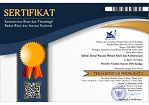Isbat nikah terpadu sebagai solusi memperoleh hak identitas hukum
Abstract
particular time and place between the Religious Court/Court of Law, the Regional Office of Citizenship
Service in a city or a district, the sub-district Office of Religious Affairs with its mobile service for giving
the marriage legalization. The integrated marriage isbat is conducted based on the rules of the Supreme
Court, Number 1 in 2015. Even though the legal basis of such integrated marriage isbat is under the
rules of the Supreme Court, yet the function remains the same that is the regulatory function or
regelende functie for the continuity of judicature implementation. The background of the issue of the
Supreme Court Rules Number 1 in 2015 is that there are so many numbers of marriages which are not
registered because of the society’s lacking access to the courts. The aim of the integrated marriage isbat
is to improve the access toward legal service and to help people, especially those who haves not, in
obtaining the rights of marriage certificate, the excerpt of marriage certificate, and the birth certificate as
simple, fast, and cheap as possible. Principally, the implementation of the integrated marriage isbat is
similar to the regular one conducted in the court; what make it different are that the place is outside the
court, free of charge, single judge, and collective vacation. Therefore it can be concluded then that the
implementation of the integrated marriage isbat is to fulfill the rights in obtaining law identity for those
who haves not as the solution for the law assurance.
Keywords
Full Text:
PDFReferences
Ade Mahmud. NH,. Hasil wawancara dengan Wapan PA Cianjur, (Ade Mahmud NH) tgl
Juli 2015. Jam 16.00 s/d 17.00 WIB).
Al-Shatibi, Abu Ishaq. Al-Muwafaqat. Beirut: Da>r al Ma’rifah, 1997.
Amin, Mawardi. Kepastian hukum Isbat Nikah Terhadap Status Perkawinan, Status Anak Dan
Status Harta Perkawinan (Penelitian Asas, Teori, Norma dan Praktik Penerapannya Dalam
Putusan Pengadilan). Jakarta: Puslitbang Kumdil, 2012.
Anonimous. Buku II tentang Pedoman Pelaksanaan Tugas dan Administrasi Peradilan Agama. Jakarta:
Badilag 2010.
Anonimous. Laporan Tahunan Badilag Tahun 2013. Jakarta: Dirjen Badilag, 2013.
Anonimous. Laporan Tahunan Badilag Tahun 2014. Jakarta: Dirjen Badilag, 2014.
Bahrum, Mukhtaruddin. “Legalisasi Nikah Sirri melalui Isbat Nikah Menurut Kompilasi
Hukum Islam”, dalam Jurnal Diskursus Islam Vol. 1 No.2, Agustus 2013.
Djazuli, A. Kaidah-Kaidah Fikih: Kaidah-Kaidah Hukum Islam Dalam Menyelesaikan Masalah-
Masalah Yang Praktis. Cet. ke-3. Jakarta: Kencana, 2010.
Farida, Maria. Ilmu Perundang-Undangan. Yogyakarta: Kanisius, 1998.
Harahap, M. Yahya. Hukum Acara Perdata, Gugatan, Persidangan, Penyitaan, Pembuktian, dan
Putusan Pengadilan. Jakarta: Sinar Grafika, 2013.
Hurairah, Abu. “Hakikat Isbat Nikah dalam Sistem Hukum Perkawinan Indonesia”, Disertasi.
Makassar: Program Pascasarkana Universitas Muslim Indonesia, 2015.
Husaini, Muh. Irfan. “Mengapa Pemeriksaan Perkara Isbat Nikah di Luar Pengadilan Harus
Terpadu” dalam www.badilag.net, diakses 2 Februari 2016.
Bowen, John. Shari’a, State, and Social Norms in France and Indonesia. Netherland:
ISIM, 2001.
Manan, Abdul. Aneka Masalah Hukum Perdata Islam di Indonesia. Jakarta: Kencana Prenada
Media Group.
Muchsin. “Problematika Perkawinan Tidak Tercatat dalam Pandangan Hukm Islam dan
Hukum Positif”, dalam Materi Rakernas Perdata Agama. Jakarta: Mahkamah Agung RI.
Mulia, Siti Musdah. Membangun Syurga di Bumi Kiat-kiat Membina Keluarga Ideal dalam Islam.
Jakarta: PT. Elex Media Komputindo, 2011.
Pangabean, Henry P. Fungsi Mahkamah Agung dalam Praktik Sehari-Hari. Jakarta: Sinar Harapan,
Sumner, Cate. Studi Dasar AIPJ Tentang Identitas Hukum Jutaan Orang tanpa Identitas Hukum
Di Indonesia. Jakarta: DFAT (Australian AID), 2013.
DOI: https://doi.org/10.18326/ijtihad.v17i1.113-133
Refbacks
- There are currently no refbacks.

This work is licensed under a Creative Commons Attribution-ShareAlike 4.0 International License.
Ijtihad: Jurnal Wacana Hukum Islam dan Kemanusiaan by http://ijtihad.iainsalatiga.ac.id/ is licensed under a Creative Commons Attribution-ShareAlike 4.0 International License







